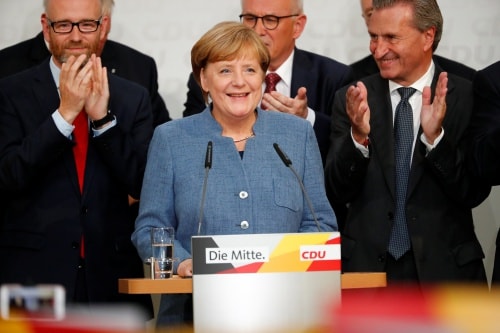The far-right party 'rises to power' - an earthquake for Merkel's fourth term
The far-right AfD party's big gains after Germany's general election are putting Mrs. Merkel before the difficult challenge of building a new coalition.
 |
German Chancellor Angela Merkel delivers a victory speech for her fourth term. Photo: Reuters. |
German Chancellor Angela Merkel won a fourth term in office in the general election on September 24. However, her victory was overshadowed by the far-right party's victory.Alternative for Germany (AfD) entered parliament for the first time in half a century.
In her victory speech, Mrs. Merkeladmitted to hoping for a better election result andsaid that the AfD's victory in parliament was "a new challenge".
Merkel's conservative Christian Democratic Union (CDU), along with its sister party, the Christian Social Union (CSU),won about 33%votes, becoming the largest group in parliament. But the figure was down sharply from 41.5% at the previous election and was the worst result for the bloc since 1949, according to AFP.
The Social Democratic Party of Germany (SPD) and its candidate Martin Schulz came second, but by a significant margin. They won only 21% of the vote.
The "shock" broke out when the AfD, a far-right party with nationalist and neo-fascist tendencies, with anti-Islamic and anti-immigration views, won 13% of the vote, equivalent to 94 of the total 631 parliamentary seats, becoming the third largest political force in Germany. Observers called the AfD's performance a "turbulent moment" in German history. The daily Bild described it as nothing less than a "political earthquake".
The biggest challenge
According to the Guardian, Mrs. Merkel's biggest challenge now is to convince the Free Democratic Party (FDP) and the Green Party to form an alliance with her.The CDU/CSU is to avoid a minority government. The German Chancellor has said she does not want to lead such a government. But the two parties are not only opposed to each other but also face a loss of credibility with voters. So, the task that Mrs. Merkel has to carry out has become more difficult than ever.
Negotiations between the parties could drag on until after Christmas, potentially forcing a new election if coalition efforts collapse.
Merkel's biggest advantage is that the AfD party needs time to stabilize its structure and organization. Cracks within the AfD began to appear on September 22 when the party's chairwoman, Frauke Petry, said she would not join parliament with her colleagues.
"We should make public the qualitative differences within AfD," Ms Petry said. "A party that is unstable... cannot offer voters a government that is trustworthy."
Merkel's CDU party needs to find one or more coalition partners to form a majority government or be content with a minority government. The CDU-SPD alliance had secured 53% of the vote but that chance was blown away after the SPD chairman, Mr.Martin Schulz admitted defeat on the evening of September 24."This is a difficult and gloomy day for democratic society in Germany," he said."We are not yet there," Schulz told supporters.
Many SPD officials insist they can only revive their former status if they become an opposition party. If the SPD stays out of the cabinet, they will be able to block the AfD from taking the opposition leadership role and gain the associated parliamentary privileges.
This means that Mrs. Merkel will have to seek another, albeit less stable, coalition with the FPD and the Greens. The CDU/CSU - FDP - Greens alliance, often called the "Jamaica Alliance" because the party colors match the black, yellow and green of the Jamaican flag.
Such coalition-building is unprecedented in German history and requires the Greens to compromise on myriad policy differences, from immigration to the auto industry.
The FDP is seen as the CDU's traditional main partner and formed a cabinet with Chancellor Merkel during her second term. But the opposition between the FDP and the Greens will certainly pose a major obstacle to forming a coalition, observers say.
Several politicians from both the FDP and the Greens have publicly dismissed the possibility of a Jamaica coalition. Left-leaning Greens have also expressed skepticism.
"We are not dependent on building a 'Jamaica coalition' at all costs," FDP vice-chairman Wolfgang Kubicki told reporters yesterday.
If the deal fails, Ms. Merkel could consider pursuing a minority government with support from three potential coalition partners: the FDP, the SPD and the Greens. But in a televised speech on September 24 evening, she appeared to rule out that possibility, emphasizing the goal of "building a stable government in Germany."
According to VNE
| RELATED NEWS |
|---|








